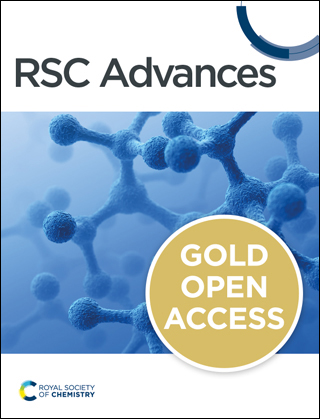What would you like to know about RSC Advances?
Impact factor: 3.9*
Time to first decision (all decisions): 15.0 days**
Time to first decision (peer reviewed only): 27.0 days***
Acceptance rate (2023): 37%
Editors-in-Chief: Russell Cox and Karen Faulds
Indexed in Scopus, Web of Science, Directory of Open Access Journals (DOAJ) and PubMed Central
Publications from 105 countries in 2024
RSC Advances publishes advances in chemistry, and in topics of interest to the chemistry community.
Thoughts from our Editors-in-chief
Scientific publishing is entering an exciting period when high ethical standards, visibility and impact are all important to authors. I’m honoured to be chairing the board of RSC Advances which has already pioneered an open-access publishing model for the benefit of authors and readers.
I am proud to contribute to Royal Society Chemistry journals because I have trust and confidence in the rigour of their peer review process. As a Society publisher, high quality, peer-reviewed publications and serving the chemistry community are their main aims rather than profit. 蹤獲扦 journals have led the community in identifying gender bias in the peer review process and are leading the way in ensuring the peer review process is both fair and inclusive.

As the largest gold open access journal dedicated to the chemical sciences, we are here for everyone who wants to publish quality chemistry research and share it with the world.
We are here for everyone who needs access to work in every area of the chemical sciences and related disciplines.
And as part of the 蹤獲扦, we are at the heart of open, international research dissemination for the chemistry community.
Great science matters. We make sure the world knows it.

Breadth
We publish work in all areas of chemistry and reach a global readership
![]()
Affordability
Low APCs, discounts and waivers make publishing open access achievable and sustainable

Quality
Research to advance the chemical sciences undergoes rigorous peer review for a trusted, society-run journal

Community
Led by active researchers, we publish quality work from scientists at every career stage, and from all countries
RSC Advances in numbers
- An average acceptance rate of 39%
- Impact factor 3.9*
- CiteScore 7.5****
- Publications from 105 countries in 2024
- Associate editors in 24+ countries
- 30,000+ articles free to access and growing
- Times to first decision 27 days
Journal scope
RSC Advances papers should provide an insight that advances the chemistry field. Papers that contain little or no chemistry and are not considered to be of interest or relevance to the chemistry community are not within the scope of the journal.
The criteria for publication are that the work must be high quality, well conducted and advance the development of the field. Articles submitted to the journal are evaluated by our international team of associate editors and reviewers for the overall quality and accuracy of the science presented.
A small number of topic areas have their own additional requirements:
Molecular docking studies should include some physical or experimental validation. Studies that screen a molecule against a set of receptors with no link to physical or experimental data are not suitable for publication.
Purely computational studies on the properties of materials not yet experimentally characterized should include a discussion of the reasons why these materials are potentially interesting for the chemistry community, as well as commenting on their synthetic feasibility. Calculations demonstrating synthetic feasibility should be performed where possible.
Please ensure you have considered the following points before submitting your manuscript.
- Does the work present an advance over the existing literature? Please supply a covering letter with your submission to demonstrate how the work is advancing the field over the existing literature
- Have you provided sufficient evidence/data to support your conclusions?
- Have you provided adequate characterisation data for your materials/compounds? (Please check the supporting information section to ensure that the necessary requirements have been met and copies of relevant spectra have been provided where necessary)
- Are the results discussed in the context of the literature?
- Are the references relevant and do they appropriately reflect the existing literature?
Article processing charges and licensing
Following our peer review process, if the article is accepted, the article processing charges below will be applied to your article. There are no submission charges for RSC Advances.
| Article processing charge | |
|---|---|
|
Full price |
£1,300** |
|
Corresponding authors from India, Indonesia and Philippines |
£780** |
|
Corresponding authors from Group A & Group B |
Full APC waiver |
*15% RSC member and RSC open access agreement discount available. Applicable to full price only.
**Applicable tax will be added to the stated price.
Discounts and waivers
Use our to check if your APC is covered by an institutional agreement with us. Note, if your institution has an agreement with us that covers APCs, you will be notified of this at article acceptance.
Discounts and waivers are also available on an individual basis. Find out more about applying for a waiver.
Corresponding authors who are not already members of the 蹤獲扦 are entitled to one year’s Affiliate membership as part of their APC. Find out more about our member benefits.
As part of the submission process, authors will be asked to agree to the RSC Advances open access terms & conditions.
We offer RSC Advances authors a choice of two Creative Commons licences, CC-BY or CC-BY-NC. Publication under these licenses means that authors retain copyright of their article, but allows users to read, download, copy, distribute, print, search, or link to the full texts of articles, or use them for any other lawful purpose, without asking prior permission from the publisher or the author. Read our open access statement for further information.
All published articles are deposited with LOCKSS, CLOCKSS, Portico and the British Library for archiving.
Read more information about APC pricing for all RSC journals
See who's on the team
Editor-in-chief: Leibniz Universit瓣t Hannover, Germany
Editor-in-chief: University of Strathclyde, UK
Editorial Board Member: Trinity College Dublin, Ireland
Editorial Board Member: Ac覺badem Mehmet Ali Ayd覺nlar University, T羹rkiye
Editorial Board Member: Indian Institute of Technology Jodhpur, India
Editorial Board Member: Washington University in St Louis, USA
Editorial Board Member: Universidade Federal do Paran獺, Brazil
Editorial Board Member: Independent Researcher, Mauritius
Editorial Board Member: Lund University, Sweden
Editorial Board Member: Nanjing University, China
Editorial Board Member: University of Lethbridge, Canada
Editorial Board Member: Nanjing University, China
All submissions to RSC Advances are now handled by our international team of associate editors with representation from across all areas of the chemical sciences.
Laura Fisher, Executive Editor, Journals, ORCID
Sarah Rainford, Deputy Editor, Journals
Anna Moore, Editorial Production Manager, Journals
Namita Datta, Assistant Editor, Journals
Patrick de Jongh, Assistant Editor, Journals, ORCID:
Jie Gao, Assistant Editor, Journals
Anoushka Handa, Assistant Editor, Journals
Kate Jones, Assitant Editor, Journals
Claire Mitchell, Assistant Editor, Journals, ORCID
Karina Webster, Editorial Assistant, Journals
Jasmin AP, Publishing Assistant, Journals
Neil Hammond, Publisher, Journals ORCID
Peer review process
All submissions to RSC Advances are handled by our team of associate editors, who are established scientists actively working in research. All articles published in the journal have been through the full peer review process.
The general process for handling manuscripts is as follows:
Phase 1: Manuscripts are assigned to an associate editor with knowledge and expertise in the area. They carry out an initial assessment to ensure the manuscript meets the basic journal criteria (please see the scope section).
Phase 2: If the manuscript passes the initial assessment the associate editor sends the manuscript for peer review. Associate editors have the option to write their own reviewer report on manuscripts they handle, if they choose to do this they will prepare their report in parallel to the external reviewer who may be either a standard reviewer for the journal or a member of the review panel (see below).
If the manuscript does not pass the initial assessment it is rejected from the journal.
Phase 3: Once both reviewer reports are submitted the associate editor will consider the reports and make a decision on the manuscript. If the reports are conflicting or no clear decision can be made, an adjudicating reviewer will be consulted.
Transparent peer review
As part of our commitment to transparency and open science, RSC Advances is now offering authors the option of transparent peer review, where the editor’s decision letter, reviewers’ comments and authors’ response for all versions of the manuscript will be published alongside the article under an .
Reviewers will remain anonymous unless they choose to sign their report.
Find out more about our transparent peer review policy and read our on transparent peer review in RSC Advances.
Co-review on RSC Advances
What is it?
RSC Advances now offers co-review, which allows two individuals to collaborate on the peer review of a manuscript, with both reviewers eligible for recognition through the Web of Science Reviewer Recognition Service.
When an early career researcher writes a reviewer report on behalf of or in collaboration with their supervisor, it is usually only the supervisor, as the individual invited to review, who receives credit for the report. The introduction of co-review on RSC Advances provides a way for both parties to receive credit for their contribution.
Co-review enables early career researchers to develop their skills in peer review through collaboration with an experienced colleague and to demonstrate experience that may further their career.
How does it work?
When invited to provide a report on a manuscript, reviewers now have the option to accept, decline or co-review with a colleague. If the reviewer opts for co-review, they will be asked to provide the details of their nominated co-reviewer. Only individuals who have completed their PhD studies should be suggested. Please note, it is at the discretion of the handling editor whether the recommended individual is invited to co-review.
Once they have confirmed their suitability, the Associate Editor will invite the nominated individual to co-review the manuscript. If they choose to accept the invitation, they will be directed to the standard RSC Advances report form, which includes a question asking if they were invited for co-review.
Please note that co-reviewers must meet the RSC’s peer reviewer eligibility criteria in order to review for RSC Advances. More information can be found at our Author and Reviewer Hub.
RSC Advances Reviewer Panel
RSC Advances has a dedicated reviewer panel made up of expert reviewers from across the chemical sciences and at all career stages. All members of the reviewer panel work within our terms of reference and we are always happy to consider new applications, particularly from early career researchers and under-represented groups. To apply to join the panel please follow the instructions to become a reviewer.
Supporting information
Experimental information must be provided to enable other researchers to accurately reproduce the work. Figures should include error bars where appropriate, and results should be accompanied by analyses of experimental uncertainty. The experimental details and the characterisation data should preferably be provided as supplementary information (SI) although on occasion it may be appropriate to include some or all of this within the body of the article. This will depend on the nature of the research being reported.
Work that reports new methodology should be applied to existing compounds or materials that have been synthesised by a previous route, to clearly demonstrate how the new method is better than previous procedures.
It is the responsibility of the author(s) to provide the reviewers with the necessary information to evaluate the merit of the manuscript in terms of its scientific content. Failure to provide the necessary experimental evidence and data may result in the manuscript being withdrawn by the editor.
Subscription information
For us, it is not just about publishing work from many countries and having a global presence. We also want to make sure that everyone – including funders, policymakers and the general public – has free, unrestricted access to the research we publish. As a gold open access journal, we champion free knowledge exchange for scientific advancement.
RSC Advances is a fully gold open access journal (open access from January 2017) – articles can be downloaded free from the website with no barriers to access.
To subscribe to 2011-2016 content please email us.
Online only: ISSN 2046-2069
*2023 Journal Citation Reports (Clarivate Analytics, 2024)
**The median time from submission to first decision including manuscripts rejected without peer review from the previous calendar year
***The median time from submission to first decision for peer-reviewed manuscripts from the previous calendar year
****CiteScore 2022 counts the citations received in 2019–2022 to articles, reviews, conference papers, book chapters and data papers published in 2019–2022, and divides this by the number of publications published in 2019–2022.
- Email:
- Send us an email
- Email:
- Send us an email
- Email:
- Send us an email
Share
Advertisement
